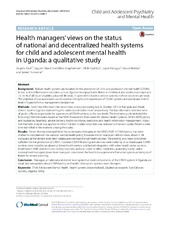Health managers’ views on the status of national and decentralized health systems for child and adolescent mental health in Uganda: a qualitative study
Akol, Angela; Engebretsen, Ingunn Marie S.; Skylstad, Vilde; Nalugya, Joyce; Ndeezi, Grace; Tumwine, James K.
Peer reviewed, Journal article
Published version

Åpne
Permanent lenke
https://hdl.handle.net/1956/12566Utgivelsesdato
2015-12-08Metadata
Vis full innførselSamlinger
Originalversjon
https://doi.org/10.1186/s13034-015-0086-zSammendrag
Background: Robust health systems are required for the promotion of child and adolescent mental health (CAMH). In low and middle income countries such as Uganda neuropsychiatric illness in childhood and adolescence represent 15–30 % of all loss in disability-adjusted life years. In spite of this burden, service systems in these countries are weak. The objective of our assessment was to explore strengths and weaknesses of CAMH systems at national and district level in Uganda from a management perspective. Methods: Seven key informant interviews were conducted during July to October 2014 in Kampala and Mbale district, Eastern Uganda representing the national and district level, respectively. The key informants selected were all public officials responsible for supervision of CAMH services at the two levels. The interview guide included the following CAMH domains based on the WHO Assessment Instrument for Mental Health Systems (WHO-AIMS): policy and legislation, financing, service delivery, health workforce, medicines and health information management. Inductive thematic analysis was applied in which the text in data transcripts was reduced to thematic codes. Patterns were then identified in the relations among the codes. Results: Eleven themes emerged from the six domains of enquiry in the WHO-AIMS. A CAMH policy has been drafted to complement the national mental health policy, however district managers did not know about it. All managers at the district level cited inadequate national mental health policies. The existing laws were considered sufficient for the promotion of CAMH, however CAMH financing and services were noted by all as inadequate. CAMH services were noted to be absent at lower health centers and lacked integration with other health sector services. Insufficient CAMH workforce was widely reported, and was noted to affect medicines availability. Lastly, unlike national level managers, lower level managers considered the health management information system as being insufficient for service planning. Conclusion: Managers at national and district level agree that most components of the CAMH system in Uganda are weak; but perceptions about CAMH policy and health information systems were divergent.
Utgiver
BioMed CentralOpphavsrett
Copyright Akol et al.Beslektede innførsler
Viser innførsler beslektet ved tittel, forfatter og emneord.
-
Attributes and consequences of health information systems data for antenatal care : Health status, health system performance and policy
Venkateswaran, Mahima (Doctoral thesis, 2019-11-05)Background: A routine health information system (RHIS) serves as an important source of data for monitoring health of clients and health system performance. All countries use RHIS data for some form of priority setting; ... -
A Critical Perspective on Mental Health News in Six European Countries: How Are “Mental Health/Illness” and “Mental Health Literacy” Rhetorically Constructed?
Van Beveren, Laura; Rutten, Kris; Hensing, Gunnel; Spyridoula, Ntani; Schønning, Viktor; Axelsson, Malin; Bockting, Claudi; Buysse, Ann; de Neve, Ine; Desmet, Mattias; Dewaele, Alexis; Giovazolias, Theodoros; Hannon, Dewi; Kafetsios, Konstantinos; Meganck, Reitske; Øverland, Simon Nygaard; Triliva, Sofia; Vandamme, Joke (Journal article; Peer reviewed, 2020)In this study, we aim to contribute to the field of critical health communication research by examining how notions of mental health and illness are discursively constructed in newspapers and magazines in six European ... -
Global Health in the Age of COVID-19 Responsive Health Systems Through a Right to Health Fund
Friedman, Eric A; Gostin, Lawrence O; Maleche, Allan; Ruano, Ana Lorena; Rusike, Itai; Alwan, Ala; Flores, Walter; Mulumba, Moses; Pūras, Dainius (Journal article; Peer reviewed, 2020)We propose that a Right to Health Capacity Fund (R2HCF) be created as a central institution of a reimagined global health architecture developed in the aftermath of the COVID-19 pandemic. Such a fund would help ensure the ...
